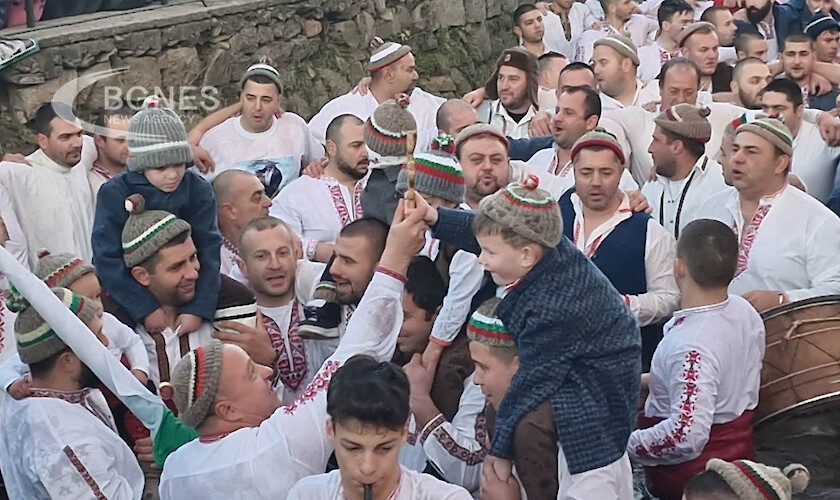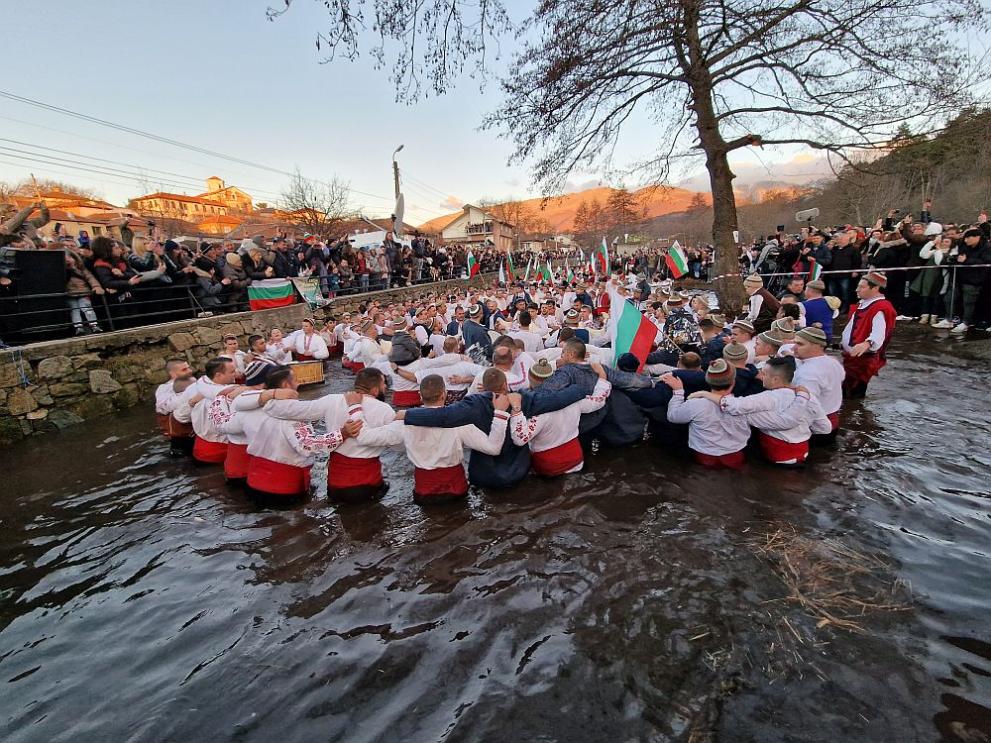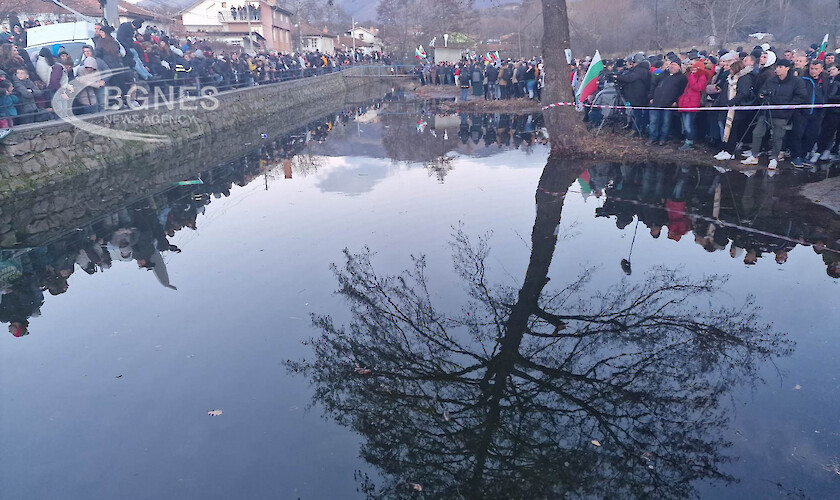Bulgarians Celebrate Epiphany and Saint Jordan’s Day: The Cross in Thrown in the River
Society | January 6, 2023, Friday // 09:08| views
@BNT
On January 6, Bulgarians celebrate Epiphany or St. Jordan’s Day (Yordanovden) - one of the biggest Christian holidays in the Bulgarian calendar.
On this day, St. John the Baptist baptized the Son of God in the Jordan River. The Bulgarian believes that, as then, the sky opens and God fulfills wishes. The pagan ancestors also believed in the same way, when on the same day they prayed to Dazhbog (the Slavic god), who fulfills wishes, on the same night.
The Feast of the Epiphany is also called Enlightenment, because the Jordanian event enlightens by showing God manifested in the unfathomable mystery of the consubstantial and indivisible Trinity. Everyone through Holy Baptism is adopted by the Father of Light through the merit of the Son and through the power of the Holy Spirit.
The rituals of St. Jordan's Day in traditional folklore are associated with baptism and the consecration of water and the cross, therefore in many places this holiday is called ”Voditsi”.
On this day, a festive Epiphany liturgy is performed, water is consecrated, and then the priests go to a body of water (sea, river, lake) where they throw the cross, and the one among the men who catches it will be healthy throughout the year.

In Kalofer, on this day, the extremely spectacular men's dance is held in the icy waters of the Tundzha River, as it is believed that anyone who enters the January icy waters will be kept away from diseases throughout the year.
With the baptism of water, the world acquires new value and power, becomes a safer place to live. End the so-called dirty days i.e. evil forces are defeated and banished.
Holy baptism is one of the seven sacraments of faith (the others are anointing, eucharist, penance, priesthood, marriage, anointing) in which a person is cleansed of sins.
According to the beliefs of the old Bulgarians, at midnight, on the night of the holiday, the rivers stop flowing and become healing. It is also believed that the water of this day has sacred properties and is therefore kept throughout the year, being used for medicine.
On the night before the holiday, when "the sky opens", it is believed that any wish will come true, as long as a person says what they want out loud.
According to the Orthodox tradition, on this day in every temple, a water ceremony is held, as the water is also preserved throughout the year and is believed to have healing power. An interesting fact is that this holy water is not mixed with other holy waters, but kept separately.
According to folk tradition, the home, the yard, the barns and the homes and stables with animals are sprinkled with the holy water, so that they will be healthy and "sanctified" during the year. Each member of the family is sprinkled with holy water - also for health.
In many places there is also a tradition of priests going through people's homes and sprinkling holy water for health and sanctification.
It is also a popular tradition for young women to wash their faces with water so that their faces are white and ruddy. Parts of the plow are brought to the river and melted to make the wheat white, and three sheaves of the New Year's Eve are thrown into the river to wash away all evil.
Bread is mixed with the holy water, and the water is put into the wine and cabbage juice, as it is believed that they will not spoil. On this holiday, the ashes from the hearth are also collected, as it is also believed to have healing powers.
In some parts of the country, after returning from church, people put an axe with the blade up and everyone jumps over it to stop diseases and all evil.
In southwestern Bulgaria, the rite of bathing with water on this day is called Men's Voditsi, and in the Rhodopes it is called Haskane.
Various fortune-telling is also done on this holiday. For example, ivy is used to predict health and long life. Also, for unmarried people in the southwestern parts of the country, rings are used to guess which girl will marry whom.
There is a belief that if on this day the wrist with which the priest sprinkles holy water freezes, the year will be healthy and fruitful, if it is warm on the day itself - the wheat will be thick, and if the weather is mild in the days before the holiday, then the year will not be good. It is also believed that if the wind blows on this day, the whole year will be windy.
Name day have: Jordan, Yordan, Bogdan, Yordanka, Dancho, Danka, Boril, Bogomil, Bistra, Nayden, Bozhidar, Bozhidara and their derivatives.
The men's horo stepped into the waters of the Tundzha River in Kalofer
Exactly 10 minutes before 8 o'clock in the morning, boys, young men and the older residents of Kalofer, led by the mayor Rumen Stoyanov, who held the Bulgarian flag, stepped into the waters of the Tundzha River. Hundreds are the spectators of the ritual. Before entering the waters, the horo participants were blessed by Father Dimitrii from the Church of the Holy Archangel. From there, the procession with drums and folk people went to the Church Bridge on the Tundzha River.
The men sing the song "Zalubiela e Vasilka".
Traditionally, the locals enter the icy waters of the river first, and then the guests who wish to do so.
The men's horo enters the waters of the river, which are not icy this year, but cold enough to cleanse and temper the brave.
Minutes later, the Christ's Cross was saved from the icy waters of the Tundzha River. The ritual was performed next to the Church Bridge on the river under shouts of "Bulgarians. Heroes".
After saving the cross, it was given to the smallest participant in the male dance. Here, "rescuing" the cross on Yordanovden is not carried out as in other parts of Bulgaria, but that is why Kalofer is a special place on this day - Kalofer people hand over the cross to the youngest member of the choir. After the cross is removed, anyone who wishes will be able to touch it and kiss it for health.


Between 100 and 150 people entered the Tundzha for the annual ritual, although the river is not particularly full this year. The weather is clear, people from almost all of Bulgaria have come to the hometown of Botev. The air temperature is about 7 degrees Celsius, on the river - about 3, the weather is too atypical for winter. There is also a committee of governors of mayors from Northern Bulgaria who came to support Rumen Stoyanov, who has been defending the tradition and defending the unique ritual for years.
One of the distinctive things about the men's dance in Kalofer is its preparation, which began the day before with strong red wine and homemade appetizers. By tradition, the mayor Rumen Stoyanov and the main participants in the men's choir warmed up in the mayor's tavern all night, playing bagpipes and drums and singing songs.

In recent years, hundreds have come to the town of Botev to "touch" the tradition. The mayor called on the people who came to watch the men's horo to stay until noon and attend the celebration of the anniversary of Hristo Botev's birth.
The men's dance in Kalofer is one of a kind and has been performed only in the sub-Balkan town for more than 100 years.
All guest houses and hotels in the city are crowded with tourists.
According to legend, Kalofer was founded in 1533. At that time, a group of men led by Kalifer the Voivode, "ruled" this part of Stara Planina and constantly attacked passing Turkish caravans. The impossibility of dealing with Kalifer the Voivode and his men forced the Sultan to allow the outlaws to settle in these lands on the condition that they cease to attack the caravans. The voivode accepted the offer and settled on the land of today's Kalofer. In the following centuries, Kalofer grew as an important cultural and commercial center, with a profitable livelihood for the local people, which is why it was called "Alton Kalofer" - Golden Kalofer. Kalofer was burned several times by the Turks. The last burning of Kalofer took place in 1877, when all the men were killed and the town was destroyed.

Also today in Kalofer, the 175th anniversary of the birth of the revolutionary poet Hristo Botev will be solemnly celebrated. At 11.30 am, flowers will be laid in front of the monument of Ivanka Boteva - mother of the revolutionary. After that, there will be a rally-pilgrimage in front of the "Hristo Botev" memorial complex, where a "Garland of Glory" will be laid in front of the hero's monument.
Follow Novinite.com on Twitter and Facebook
Write to us at editors@novinite.com
Информирайте се на Български - Novinite.bg
/BGNES
We need your support so Novinite.com can keep delivering news and information about Bulgaria! Thank you!
Back
